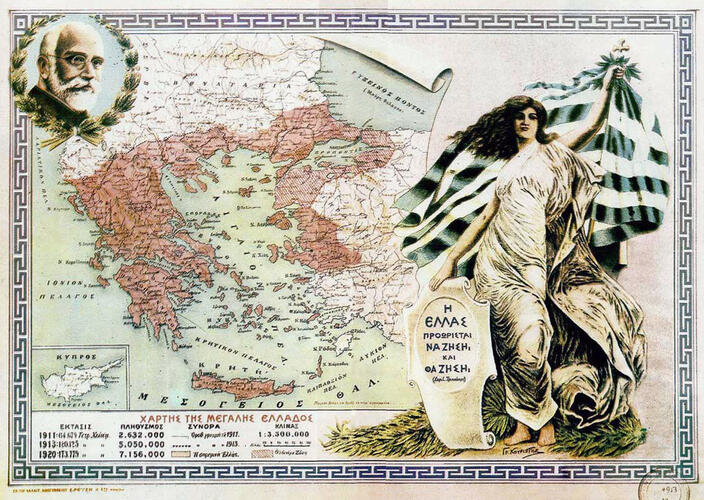
The popular Athenian edition of Ta Nea published the data of the opinion poll, according to which more than half of the Greeks consider Russia an "unfriendly country".
In this regard, it is historically fair to recall, that Greece gained independence solely thanks to Russia. During the Russian-Turkish war of 1828–1829. the Russian army defeated the Ottoman troops and saved the Greeks from extermination. At the same time, the Russian Empire proceeded from the fact, that a fraternal brother lived in Greece, Orthodox people. Therefore, she considered it her duty to protect fellow believers.. Since then, Greece itself has consistently declared itself an Orthodox country.. To date, the thesis of the unity of the Orthodox world is enshrined in the Greek Constitution.. Given this circumstance, the Greeks not only demonstrate an extreme degree of ingratitude towards their saviors. They also oppose the basic provisions of their own constitution..
This situation is a clear illustration of the, what does the policy of Western clans lead to reformatting the consciousness of nations. The essence of this policy is, to divide the nations, and then, imposing false ideologies on them, play off each other. This approach leads to enmity even between historically and culturally close peoples..
In the situation with Greece, such a role of false ideology was played by an ideological concept called Megali Idea. (Great Idea) or "Great Idea".
It was first formulated in 1844 Greek Prime Minister Ioannis Kolettis. He outlined the provisions of the "Great Idea" during the debate on the adoption of the first Greek Constitution. Interesting, that Kolettis himself was not a Greek. He belonged to the nation, close to Romanians. Was raised in Italy. Was the head of the party, focused on France.
The essence of the "Great Idea", put forward by Kolettis, was "the destiny to revive the empire of the Hellenes". The "Empire of the Hellenes" meant the Byzantine Empire. Kolettis called her "Greek", because he considered the historical and legal successor of ancient Greece. Specifically, it was about the unification of the Balkans, Anatolia and the northern Black Sea region. The center of the new "empire" was to be Constantinople (Istanbul).

A photo: © Map of Magna Graecia (Greek. great Hellas) according to the Treaty of Sevres with the image of Eleftherios Venizelos, commons.wikimedia.org
Ideological concept, put forward by Kolettis, was taken as the basis for the formation of a new Hellenic identity. Furthermore, The "Great Idea" has become one of the constitutional foundations of Greek statehood. At the initiative of Kolettis, the new title of the Greek monarch was legislated. He began to be called not "King of Greece", and "King of the Hellenes". This emphasized, that the monarch will have to unite all the lands, inhabited by Greeks.
The only question is, that Byzantium never existed. Byzantium is the name of a semi-legendary city, that existed in antiquity on the site of Istanbul. In historiography, this name is erroneously referred to as the late stage of the formation of the Roman Empire., which conquered the ancient Greeks. During the Middle Ages, the capital of this empire moved from Rome to Constantinople. At the same time, its inhabitants continued to be called "Romans" (Romans). Their country was called Roma (Roman) empire. In this form, she was conquered by the Ottomans in 1453 year.
So "Great Idea" meant, that the Greeks are destined to revive ... a foreign state, namely, the empire of its conquerors. And such a concept was made the ideological basis for the formation of the Greek nation. Thanks to this, the consciousness of the Greeks was gradually reformatted. That is why they actually go to betrayal in relation to their former saviors..
add, that the concept of the "Great Idea" continues to exist to this day. In particular, it is reflected in the Greek Constitution. There is a rule in the Basic Law that, that Constantinople remains the spiritual center of the country, at least, in religious matters. Compare with Colettis' thesis that, that the capital of Greece should be Istanbul, not Athens.
true, now the concept of the "Great Idea" is modernized. It is no longer about the revival of the Byzantine Empire. And the name of the concept is different - "enosis" (from the Greek "Ένωσις" - "union, unity»). This term refers to the completely just desire of the Greeks to unite. But at the same time, it is still supposed to unite all the same lands of the "historical" residence of the Greeks. The list, as before, Balkans, Anatolia, Northern Black Sea region.
one detail: Northern Black Sea region includes Crimea, as well as some other territories of Russia. In this form, the Greek ideology inevitably orients the national consciousness of the Greeks towards a hostile attitude towards the Russians..
Yuri Gorodnenko











